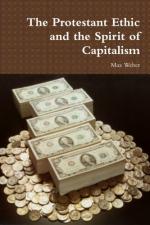
|
| Name: _________________________ | Period: ___________________ |
This test consists of 15 multiple choice questions and 5 short answer questions.
Multiple Choice Questions
1. What word is used to describe the Catholic church in the 15th century?
(a) Strange.
(b) Distant.
(c) Lax.
(d) Harsh.
2. What does the author say a man needs to make money?
(a) Time.
(b) All of these.
(c) Money.
(d) Intelligence.
3. When are low wages most effective?
(a) When food prices are low.
(b) When there are not enough jobs.
(c) When there are unskilled workers.
(d) When there are wars.
4. Where do men in the modern world have to prove their fitness?
(a) The social world.
(b) The physical world.
(c) The educational world.
(d) The economic world.
5. Why do some laborers prefer to find loopholes in the system?
(a) They are not honest in nature.
(b) They are a laborer and not a master.
(c) They have no loyalty.
(d) They have no motivation for growth.
6. What does the author say a man does when he is idle?
(a) Offends God.
(b) Dies a little.
(c) Throws money away.
(d) Wastes all he has.
7. What practice will be enhanced the most by the author's list of do's?
(a) All of these.
(b) Business practice.
(c) Relationship practice.
(d) Skills practice.
8. What part of the population most embraced the Catholic church?
(a) The wealthy.
(b) The nobles.
(c) The middle class.
(d) The poor.
9. Who did Frederick I of Prussia was indispensable?
(a) Mormons.
(b) Methodists.
(c) Mennanites.
(d) Mercurials.
10. Where do most Capitalism leaders get their money?
(a) Working.
(b) Business trades.
(c) Grants.
(d) Inheritance.
11. What did Montesquieu say England was successful in?
(a) All of these.
(b) Business.
(c) Religion.
(d) Liberty.
12. Where did Reformers think the most control would be needed?
(a) Country areas.
(b) Big city areas.
(c) Developed areas.
(d) Peasant areas.
13. Why did the author hesitate to define the spirit of capitalism?
(a) It thins out the discussion.
(b) There are lots of different definitions that fit.
(c) There is not really a definition.
(d) It changes a lot.
14. Which of these traits must be practiced to make Capitalism work?
(a) Knowledge.
(b) Kindness.
(c) Discipline.
(d) Memorization.
15. What was unique about the French Hugenot church?
(a) Monks and businessmen rubbed shoulders.
(b) Friars were paid.
(c) They had constant revelation.
(d) They had a re-translation of the Bible.
Short Answer Questions
1. What must there be a surplus of for Capitalism to succeed?
2. How is money looked at in modern economies?
3. What does the author say all money lenders will consider?
4. What best instills a sense of responsibility in work?
5. What did the Reformation NOT get rid of?
|
This section contains 391 words (approx. 2 pages at 300 words per page) |

|




